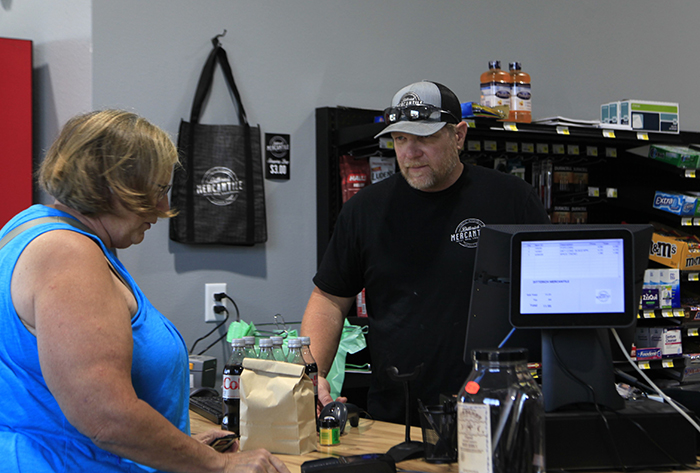Local foods and regenerative agriculture in rural Minnesota
News | Published on November 19, 2024 at 3:57pm EST | Author: frazeevergas
0
By Kate Mudge,
West Central Initiative
As the harvest season ends, efforts to strengthen a sustainable, resilient food system in west central Minnesota continue to expand. Communities across the region are embracing local food initiatives that not only support food security, but also promote environmental stewardship.
Projects like the West Central Minnesota Food Council, The Bridge Center, and the Growing Grant County Project are leading the way toward a healthier, more sustainable future.
Why local food systems matter
Local food systems are the backbone of rural economies and community health. By producing, processing, and consuming food within the region, communities reduce dependency on long supply chains and large-scale industrial agriculture. This approach supports small farms, provides fresher food, and minimizes environmental impact.
The West Central Minnesota Food Council is committed to increasing access to nutritious food and empowering residents to adopt sustainable practices. Guided by the West Central Minnesota Regional Food System Plan, published in 2023, the Food Policy Council holds monthly meetings, welcoming new members and guest speakers who share insights on strengthening local food systems.
Insights from MPR’s Rural Voice Series
Minnesota Public Radio’s Rural Voice series recently spotlighted conservation agriculture in rural Minnesota, emphasizing practices that boost soil health, biodiversity, and ecosystem sustainability.
A recent discussion at Bucks Mill Brewing in Detroit Lakes brought together local farmers and experts, including Ryan Pesch of Lida Farm, to explore the growing consumer demand for high-quality, sustainably-produced food.
“People are looking for better-quality products,” said Pesch. “It needs to be reflected in the wider economy and scaled up,” This conversation underscored the importance of extending regenerative practices to larger agricultural operations.
The Bridge Center: A community hub for local food entrepreneurship
In Pelican Rapids, The Bridge Center is transforming an old church into a vibrant community space focused on local food production, youth development, and community engagement. The community commercial kitchen designed to help local farmers, food entrepreneurs, and residents create and package their products is at the heart of this project. This shared facility provides the infrastructure needed for small-scale producers to meet regulatory standards and reach broader markets. By fostering innovation,
The Bridge Center enables entrepreneurs to develop value-added products—such as jams, sauces, and baked goods—enhancing their market potential and economic viability.
Growing Grant County: Expanding access to healthy, local foods
The Growing Grant County Project, supported by a USDA Community Food Project grant, is committed to increasing access to healthy, locally-produced food in Grant County. This project focuses on three core areas: education, local food production, and hunger relief.
As part of this initiative, Ashby and West Central Area (WCA) students learn essential skills in growing, processing, and preparing fresh foods. With the help of a mobile food processing trailer, students gain hands-on experience in butchery and food preservation, while food dehydrators and freeze dryers help extend the shelf life of produce.
WCA recently built a large greenhouse, and Ashby plans to follow suit. This year alone, over 15,000 pounds of produce, including apples, corn, and other vegetables, were donated to the Grant County Food Shelf. The Growing Grant County Project serves as a model for how rural communities can unite to improve food access, promote healthy eating, and create new economic opportunities around local food production.
Supporting Rural Grocery Stores
In rural areas, grocery stores play a crucial role in the local food system, providing residents with fresh, healthy food and offering farmers a reliable market for their products. However, small-town grocers face challenges such as competition from large chains, fluctuating demand and difficulties sourcing local products.
To address these challenges, the University of Minnesota Extension Regional Sustainable Development Partnerships received funding through the Good Food Access Program for “Support Our Stores.” This statewide initiative connects rural grocers through a peer-support network, allowing them to exchange ideas and strategies for navigating the unique challenges of small-town retail.
Supporting rural grocery stores is essential for the resilience of local food systems, and community members can help by shopping locally and choosing regionally-produced foods.
Fostering a Resilient Food Future
The future of west central Minnesota’s food system relies on collaboration across the community—farmers, consumers, institutions, and governments all play a role. By participating in farmers’ markets, joining community-supported agriculture (CSA) programs, or simply choosing local products at the grocery store, residents can contribute to a food system that is sustainable, equitable, and economically viable. Working together, our communities can build a food system that supports both people and the planet for generations to come.

